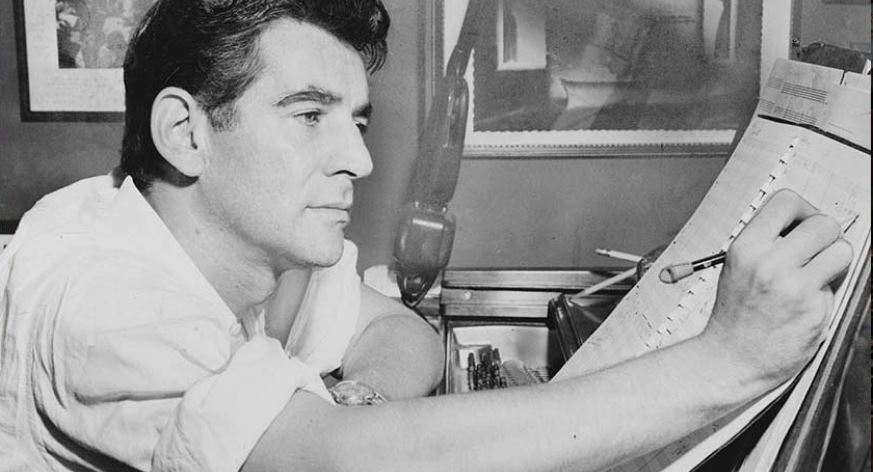At most classical concerts, there are program notes with information about the works and composers to give background and insight into the music.
Late Night with Leonard Bernstein had nothing of the sort: the performance itself was those notes. Over the course of two hours, the great American composer’s daughter, Jamie Bernstein, took the Gilmore Keyboard Festival audience on a journey through her father’s life, influences, friends and “insomniac brain.”
Bernstein’s music is everywhere: From films to in-flight airline safety announcements, high school musicals and progressive rock records. For such a well-known composer, most of the songs in Thursday’s program were early, rare compositions that most of the audience had not heard before.
The stage at Dalton Recital Hall on Western Michigan University’s campus was set up like a living room, with two pianos in the center and Jamie Bernstein telling stories of her father, the night owl, between songs. The house lights stayed on, giving the feeling of being there. The Bernstein selections included songs he wrote for friends, including Stephen Sondheim, that were compositions he drew on later.
There was a mixture of live performances and rare recordings. All of the music was performed on piano — there were no orchestra recordings, which is how much of Bernstein’s work has been heard.
A highlight of the night was a selection from Conchtown, an unreleased ballet inspired by the Cuban music he heard over the radio while vacationing in Key West, Fla. Performed on two pianos, Jamie Bernstein said we would recognize a theme that was used later on, which was America from West Side Story.
A little more than a third of the songs were not Bernstein compositions at all, but songs that inspired him and “showboating” tunes he played in college to impress friends, including Dizzy Fingers by Zez Confrey and Aaron Copland’s Piano Variations.
Pianists John Musto and Michael Boriskin handled the music masterfully, covering a wide range of styles and moods. Soprano Amy Burton gave the concert a real sense of the time period Bernstein composed in, as well his vocal work.
But it was Jamie Bernstein who brought it all together. With her recollections and stories, you could imagine the young composer performing these songs at the community piano at his college dorm, playing at home for the family out of Edvard Grieg’s “Green Book” or working through melodies that would become American classics.
The most meaningful moments of the night were not necessarily what Jamie said about her father, but how she reacted to his music. During Burton’s performance of Ain’t Got No Tears Left, daughter Bernstein mouthed along some of the lyrics, clearly still moved by her father’s work.
Near the end of the program she talked about how her father couldn’t really sing but wanted to, saying he would trade all of his gifts for the ability to sing. They cut to an intimate rare video of him playing, and singing, a fun song called Zipperfly on the piano.
When the lights came up, she had tears on her face. “It gets me every time,” she said.
During the final number, Some Other Time from Bernstein’s On the Town, Burton grabbed Jamie and they finished the song, singing it together. Learning about Bernstein from his daughter and seeing the love and memories on stage humanized the composer in a way not often possible in classical music.
There are celebrations of Bernstein across the country this year, on what would have been his 100th birthday. Leaving Dalton, the sun had set and the night had just begun. It made me wonder if any young composers were beginning to burn the midnight oil to dive deep into the ocean of inspiration, creativity, friendship and, most of all, music.
Late Night with Leonard Bernstein
Dalton Center
May 3
thegilmore.org





